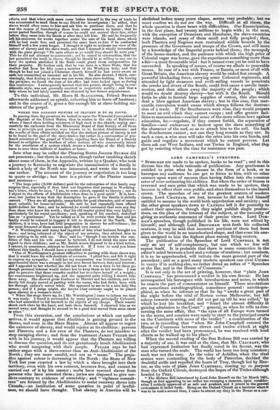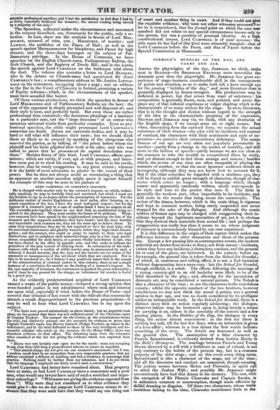LORD CAMPBELL'S SPEECHES.
" Sezzenas are made to be spoken, books to be read" ; and in this dictum lies the whole rationale of publication. Any gentleman is entitled to print what he pleases in the form of a book, or to harangue any audience he can get to listen to him, with no other censure upon want of success than having fallen into the common error of over-estimating his abilities. But when the order of fitness is reversed and men print that which was made to be spoken, they become in effect their own public, and elect themselves to the laurel crown. The speeches of one of the greatest orators of modern times, Lord CHATHAM, are lost, because he did not feel himself entitled to assume in the world both approbation and anxiety ; and the other great speakers down to CANNING left it for posterity to collect their speeches, though they might publish single produc- tions, on the plea of the interest of the subject, or the necessity of giving an authentic statement of their precise views. Lord Dna- aars's speeches, though published in his life, were not edited by himself; and although Lord BROUGHAM sent forth his collected orations, it may be said that incorrect portions of them had been given to the world in an unauthorized shape, and that even his ene- mies assigned to him the highest place among living orators.
The publication of the Speeches of Lord CAMPBELL is Dot only an act of self-complacency, but one which we fear will repeat itself. It is probable that there is some connexion in the editor's mind between a lord and a volume of orations : but numbers, it is to be apprehended, will imitate the more general part of the precedent; and as a good many modern speakers can rival CICERO in vanity if in nothing else, we rather dread an influx of" Speeches at the Bar, and in the House of Commons."
It is not only in the act of printing, however, that "plain Jona CAMPBRLL" has pronounced a verdict in his own favour. He has accompanied his harangues with introductions and notes, in which he enacts the part of commentator on himself. These annotations are sometimes autobiographical, sometimes general : autobiogra- phical, as when he informs us that he lay "awake a great part of the night before the trial of Norton versus Melbourne, but fell asleep towards morning, and did not get up till he was called," by which he lost his breakfast, and "found the utmost difficulty in gaining admission to the Court " : general, as when he tells us con- cerning the same affair, that "the eyes of all Europe were turned to the scene, and couriers were ready to start to the principal courts on the Continent with news of the verdict " : a combination of the two, as in recording that "when Sir John Campbell entered the House of Commons between eleven and twelve o'clock at night after the verdict had been pronounced, he was received with load cheers as he walked up to his place." When the second reading of the first Reform Bill was carried by a majority of one, it was said at the time, that Mr. Catcrierr, who had expressed hesitation but finally voted in its favour, was the man who turned the scale. The world has been too long mistaken; such was not the case. As the voice of Achilles, when the riva armies were contending for the body of Patroclus, decided the doubtful strife and repelled the hosts of Troy, though led by Hec- tor, so the vote of plain Jona CAMPBELL, coming up on from the Oxford Circuit, destroyed the hopes of the Tories aiT7o:711 headed by PEEL. "The Reform Bill introduced by Lord John Russell on the 1st March 1831, though at first appearing to me rather too sweeping a measure, upon consider- ation I entirely approved of as safe and prudent, and I joined in the general enthusiasm it called forth. Being on the Oxford Circuit as a barrister when it was to be read a second time, I came to attend my duty in the House at a con-
siderable professional sacrifice; and I had the satisfaction to find that I had by so doing materially furthered the measure; the second reading being carried by a majority of one only."
The Speeches, collected under the circumstances and annotated in the manner described, are, fortunately for the public, only a se- lection. In Law, there are the orations in favour of Lord MEL.. BOURNE, accused of crim. con.; MEDHURST, Of murder; and LAWSON, the publisher of the Times, of libel ; as well as the speech against HETHERINGTON for blasphemy, and FROST for high treason, and the three-days harangue on the subject of Par- liamentary privilege. In the House of Commons, we have speeches on the English Church-rates, Parliamentary Reform, the Irish Church, and the Registry of Deeds Bill; and in the Lords, the speech against Lord CARDIGAN on the burlesque trial about the duel. The volume also contains a letter to Lord STANLEY, who in the debate on Church-rates had questioned Sir Jour/ CAMPBELL'S law; a complimentary address to Mr. Justice LITTLE- was on his retirement, occupying about a page ; and an address to the Bar in the Court of Chancery in Ireland, promising a variety of Equity reforms—which, in the circumstances of the speaker, must have sounded like banter.
Of these various productions, we think the speeches in favour of Lord MELBOURNE and of Parliamentary Reform are the best : the case of the opponent is clearly presented and well disposed of; and their style is neat, and perfectly lucid. But even these are rather professional than oratorical—the dexterous pleadings of a barrister on a particular case, not the "large discourse" of an orator who enounces universal truths from particular examples. Even as pro- fessional speeches, the critic might pronounce Lord CAMPBELL'S somewhat too florid. Jurors are uncertain bodies, and it may be hard to tell what will influence their taste ; but we should think them as likely to be swayed by speaking of the clergyman who married the parties, as by talking of "the priest before whom the plaintiff and his bride plighted their troth at the altar, and who was called to prove that he pronounced the nuptial benediction over them." Besides finery of this kind, Lord CAMPBELL affects quo- tations; which are rarely, if ever, apt or with purpose, and there- fore seem put in to show his reading. It may be said to his credit, however, that he rarely exaggerates to any great extent ; whereas it is the habit of most advocates to plaster to the extent of their power. But he does not always avoid so overstating a thing that an opponent on another occasion might quote it against himself: An example of this may be seen in his picture of
LORD CAMPBELL ON CORONER'S INQUESTS.
He is charged with murder only by the coroner's inquest, on which, techni- cally speaking, he may be lawfully tried and convicted, but which I must use the freedom to say in no degree rebuts the presumption of innocence. For the deliberate verdict of twelve Englishmen on their oaths, after listening to a sound exposition of the law, I have the most unfeigned respect; but for the inquest of a coroner's jury in a case of sudden death I have no respect at all.
The constable gets together whom he can first find, no qualification being re- quired in the jurymen. They meet amidst the fumes of an alehouse. What- ever rumours have been spread in the neighbourhood respecting the fate of the deceased and the supposed murderer, they have heard ; and the more horrible and improbable such rumours are, they are the more apt to believe them. To calm their imaginations, they are by law required to view the dead body, with its convulsed countenance and ghastly wounds, before they begin their investi- gation; and the coroner, who ought as judge to explain to them nice legal distinctions and to enlighten their understandings, may be a low legal practi- tioner, unqualified for such duties, or a person wholly uninitiated in law, who has been elected to the office by popular arts, and who seeks to inflame the prejudices of the jury instead of allaying them. In extenuation of the reck- lessness with which a verdict of wilful murder may be pronounced by such a tribunal, I should mention, that the jury and the coroner are not aware of the solemnity or consequences of the act about which they are employed. Nor is this to be wondered at; for I believe I may positively assert that in the annals of the administration of criminal justice in this country, there is not a single instance of a conviction for murder on the finding of a coroner's inquest. In the vast majority of instances, the instrument is quashed for gross informality ; and if there be any ground for the charge, an indictment for murder is found by a grand jury.
As the evidently predetermined acquittal of Lord CARDIGAN caused a waste of the public money—induced a strong opinion that even-handed justice is not administered where rank and interest are upon trial, especially if tried before the House of Peers—and covered that tribunal of last resort with the ridicule that necessarily attends a result disproportioned to the previous preparations—it may be well to bear what Lord CAMPBELL has to say upon the subject.
"The facts were proved substantially as above stated; but an acquittal took place, on the ground that there was not sufficient proof of the Christian name of Captain Tuckett. The counsel for the Crown, at the consultations before the trial, had distinctly pointed out the necessity for evidence to prove that Captain Tuckett's name was Harvey Garnett Phipps Tuckett, as stated in the indictment ; and in the brief delivered to them by the very intelligent and ho- nourable solicitor who acted on the occasion for the Home Office, there was abundant evidence to that effect. The deficiency arose from the witnesses when examined at the bar not giving the evidence which was expected from them.
"Blame was very lavishly cast upon me for the result: some not scrupling to say that there had been a premeditated scheme to insure an acquittal.
" This absurd charge did not give me one moment's uneasiness : but I was, I confess, much hurt by an accusation from very respectable quarters, that my address contained a defence of duelling, and had a tendency to encourage that practice. Nothing could be further from my intention, and I do not think that the languagel employed can fairly receive such a construction."
Lord CAMPBELL had better have remained silent. Had property been at stake, or had Lord CARDIGAN been a commoner and a poor man, what would any lawyer have said of such a wretched and impu- dent subterfuge ? "Witnesses not giving the evidence expected from them " I Why were they not examined as to what evidence they could give ?—for WC do not suppose Lord CAMPBELL means to in- sinuate that they were such liars that they would say one thing out of court and another thing in court. And if they could not give the requisite evidence, why were not other witnesses procured ?— for be it remembered, that the formal point on which the case was quashed did not relate to any special circumstance known only to one person, but was a question of personal identity. As a high constitutional lawyer, Lord CAMPBELL is of poor account: the only cases he has had of this kind were miserably bungled—that of Lord CARDIGAN before the Peers, and that of FROST before the Special Commission at Monmouth.



























 Previous page
Previous page